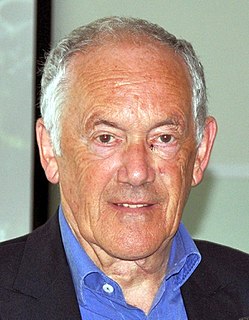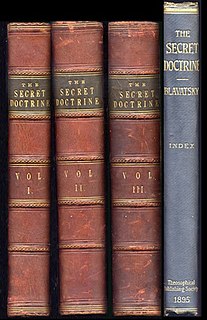Related Research Articles

Creationism is the religious belief that nature, and aspects such as the universe, Earth, life, and humans, originated with supernatural acts of divine creation. In its broadest sense, creationism includes a continuum of religious views, which vary in their acceptance or rejection of scientific explanations such as evolution that describe the origin and development of natural phenomena.
A chemical element refers to all aspects of the species of atoms that have a certain number of protons in their nuclei, including the pure substance consisting only of that species. Unlike chemical compounds, chemical elements cannot be broken down into simpler substances by any chemical reaction. The number of protons in the nucleus is the defining property of an element, and is referred to as its atomic number – all atoms with the same atomic number are atoms of the same element. Almost all of the baryonic matter of the universe is composed of chemical elements. When different elements undergo chemical reactions, atoms are rearranged into new compounds held together by chemical bonds. Only a minority of elements, such as silver and gold, are found uncombined as relatively pure native element minerals. Nearly all other naturally occurring elements occur in the Earth as compounds or mixtures. Air is primarily a mixture of the elements nitrogen, oxygen, and argon, though it does contain compounds including carbon dioxide and water.

Biological anthropology, also known as physical anthropology, is a scientific discipline concerned with the biological and behavioral aspects of human beings, their extinct hominin ancestors, and related non-human primates, particularly from an evolutionary perspective. This subfield of anthropology systematically studies human beings from a biological perspective.

Richard Erskine Frere Leakey was a Kenyan paleoanthropologist, conservationist and politician. Leakey held a number of official positions in Kenya, mostly in institutions of archaeology and wildlife conservation. He was Director of the National Museum of Kenya, founded the NGO WildlifeDirect and was the chairman of the Kenya Wildlife Service.

Theistic evolution, also known as theistic evolutionism or God-guided evolution, is a general term comprising views that regard religious teachings about God as compatible with modern scientific understanding about biological evolution. Theistic evolution is not in itself a scientific theory, but a range of views about how the science of general evolution relates to religious beliefs in contrast to special creation views. Theistic evolutionists accept the scientific consensus on the age of the Earth, the age of the universe, the Big Bang, the origin of the Solar System, the origin of life, and evolution.
Paleoanthropology or paleo-anthropology is a branch of paleontology and anthropology which seeks to understand the early development of anatomically modern humans, a process known as hominization, through the reconstruction of evolutionary kinship lines within the family Hominidae, working from biological evidence and cultural evidence.
The Royal Society Science Books Prize is an annual £25,000 prize awarded by the Royal Society to celebrate outstanding popular science books from around the world. It is open to authors of science books written for a non-specialist audience, and since it was established in 1988 has championed writers such as Stephen Hawking, Jared Diamond, Stephen Jay Gould and Bill Bryson. In 2015 The Guardian described the prize as "the most prestigious science book prize in Britain".

George Christopher Williams was an American evolutionary biologist.

Peter William Atkins is an English chemist and a Fellow of Lincoln College at the University of Oxford. He retired in 2007. He is a prolific writer of popular chemistry textbooks, including Physical Chemistry, Inorganic Chemistry, and Molecular Quantum Mechanics. Atkins is also the author of a number of popular science books, including Atkins' Molecules, Galileo's Finger: The Ten Great Ideas of Science and On Being.

The Secret Doctrine, the Synthesis of Science, Religion and Philosophy, is a pseudo-scientific esoteric book originally published as two volumes in 1888 written by Helena Blavatsky. The first volume is named Cosmogenesis, the second Anthropogenesis. It was an influential example of the revival of interest in esoteric and occult ideas in the modern age, in particular because of its claim to reconcile ancient eastern wisdom with modern science.

Recurring cultural, political, and theological rejection of evolution by religious groups exists regarding the origins of the Earth, of humanity, and of other life. In accordance with creationism, species were once widely believed to be fixed products of divine creation, but since the mid-19th century, evolution by natural selection has been established by the scientific community as an empirical scientific fact.

Stephen C. Meyer is an American author and former educator. He is an advocate of the pseudoscience of intelligent design and helped found the Center for Science and Culture (CSC) of the Discovery Institute (DI), which is the main organization behind the intelligent design movement. Before joining the DI, Meyer was a professor at Whitworth College. Meyer is a Senior Fellow of the DI and Director of the CSC.

Gateway to the Great Books is a 10-volume series of books originally published by Encyclopædia Britannica Inc. in 1963 and edited by Mortimer Adler and Robert Maynard Hutchins. The set was designed as an introduction to the Great Books of the Western World, published by the same organization and editors in 1952. The set included selections – short stories, plays, essays, letters, and extracts from longer works – by more than one hundred authors. The selections were generally shorter and in some ways simpler than the full-length books included in the Great Books.
Roger Lewin is a British prize-winning science writer and author of 20 books.

The Oxford Book of Modern Science Writing is an anthology of scientific writings, arranged and introduced by Richard Dawkins of the University of Oxford. Published first in March 2008, it contains 83 writings on many topics from a diverse variety of authors, which range in length from one to eight pages. All inclusions are dated post-1900, and include poetry, anecdotes, and general philosophical musings.
The Silliman Memorial lectures series has been published by Yale University since 1901. The lectures were established by the university on the foundation of a bequest of $80,000, left in 1883 by Augustus Ely Silliman, in memory of his mother, Mrs. Hepsa Ely Silliman. Hepsa Ely was the daughter of the Reverend David Ely, a member of the Yale College Class of 1769. She was married to Gold Selleck Silliman, brother of Professor Benjamin Silliman and a 1796 graduate of Yale College. She was the mother of two sons, August Ely Silliman and Benjamin Douglas Silliman. Benjamin graduated from Yale College in 1824.
Although biological evolution has been vocally opposed by some religious groups, many other groups accept the scientific position, sometimes with additions to allow for theological considerations. The positions of such groups are described by terms including "theistic evolution", "theistic evolutionism" or "evolutionary creation". Of all the religious groups included on the chart, Buddhists are the most accepting of evolution. Theistic evolutionists believe that there is a God, that God is the creator of the material universe and all life within, and that biological evolution is a natural process within that creation. Evolution, according to this view, is simply a tool that God employed to develop human life. According to the American Scientific Affiliation, a Christian organization of scientists:
A theory of theistic evolution (TE) — also called evolutionary creation — proposes that God's method of creation was to cleverly design a universe in which everything would naturally evolve. Usually the "evolution" in "theistic evolution" means Total Evolution — astronomical evolution and geological evolution plus chemical evolution and biological evolution — but it can refer only to biological evolution.

Teleology in biology is the use of the language of goal-directedness in accounts of evolutionary adaptation, which some biologists and philosophers of science find problematic. The term teleonomy has also been proposed. Before Darwin, organisms were seen as existing because God had designed and created them; their features such as eyes were taken by natural theology to have been made to enable them to carry out their functions, such as seeing. Evolutionary biologists often use similar teleological formulations that invoke purpose, but these imply natural selection rather than actual goals, whether conscious or not. Dissenting biologists and religious thinkers held that evolution itself was somehow goal-directed (orthogenesis), and in vitalist versions, driven by a purposeful life force. Since such views are now discredited, with evolution working by natural selection acting on inherited variation, the use of teleology in biology has attracted criticism, and attempts have been made to teach students to avoid teleological language.
References
- 1 2 Kauffman, George B. (1996). "The Periodic Kingdom: A Journey into the Land of the Chemical Elements". Journal of Chemical Education. 73 (8): A177. doi: 10.1021/ed073pA177.1 .
- ↑ Gorman, James (14 October 1997). "Nimble Deal-Maker For Stars Of Science". The New York Times.